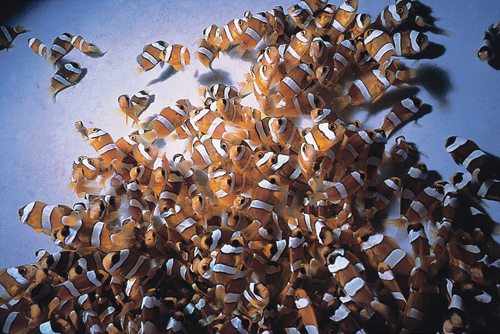Difference between revisions of "Ornamental Fish Q&A 01"
Ggaitskell (talk | contribs) |
|||
| Line 13: | Line 13: | ||
The substitution of soy bean meals and/or oils for the more expensive marine fish meals/oils (e.g. menhaden or herring meal, squid oil) in commercial/retail fish diets often significantly compromises the immune system over time, and results in marine fish that cannot endure the stress of handling. | The substitution of soy bean meals and/or oils for the more expensive marine fish meals/oils (e.g. menhaden or herring meal, squid oil) in commercial/retail fish diets often significantly compromises the immune system over time, and results in marine fish that cannot endure the stress of handling. | ||
| − | |l1= | + | |l1=Stress Shock Syndrome |
|q2=What factor(s) would you examine to investigate the problem? | |q2=What factor(s) would you examine to investigate the problem? | ||
|a2= | |a2= | ||
| Line 23: | Line 23: | ||
While such substitutions are often nutritionally adequate on a short-term basis, or for intermittent feedings, a diversity of marine foods provides the optimal nutrition necessary to maintain immune system function, coloration, and growth in captivity. | While such substitutions are often nutritionally adequate on a short-term basis, or for intermittent feedings, a diversity of marine foods provides the optimal nutrition necessary to maintain immune system function, coloration, and growth in captivity. | ||
| − | |l2= | + | |l2=Stress Shock Syndrome |
|q3=How can you confirm the diagnosis? | |q3=How can you confirm the diagnosis? | ||
|a3= | |a3= | ||
| Line 31: | Line 31: | ||
Due to research into quality marine diets, captive-raised marine fish often maintain superior immune function and stress resistance compared to their wild-caught counterparts. | Due to research into quality marine diets, captive-raised marine fish often maintain superior immune function and stress resistance compared to their wild-caught counterparts. | ||
| − | |l3= | + | |l3=Stress Shock Syndrome |
</FlashCard> | </FlashCard> | ||
Revision as of 22:14, 28 October 2011
These captive raised Indopacific anemonefish, were cultured in a commercial fish hatchery. Occasionally, when marine fish are captive raised, or held in captivity for some time, they may experience ‘stress shock’ when netted, handled, or moved. Clinical signs of this syndrome include rapid, short movements followed almost immediately by total body stiffening (muscle tetanus). While mortality may reach 80%, some fish will fully recover within several hours.
| Question | Answer | Article | |
| What is the cause of this ‘stress-shock syndrome?’ | Stress shock in marine fish that have been captive raised, or held in captivity for some time, is most often associated with the lack of proper assimilation of vegetable/-plant-based lipids (oils) in the diet. The substitution of soy bean meals and/or oils for the more expensive marine fish meals/oils (e.g. menhaden or herring meal, squid oil) in commercial/retail fish diets often significantly compromises the immune system over time, and results in marine fish that cannot endure the stress of handling. |
Link to Article | |
| What factor(s) would you examine to investigate the problem? | Thoroughly examine the long-term (15–30+ days) diet of the fish. Were they fed a diversity of frozen, live and dry commercial diets, or was their diet exclusively commercial flake food? Many aquarists substitute non-marine foods (such as lettuce for marine seaweeds) for convenience. While such substitutions are often nutritionally adequate on a short-term basis, or for intermittent feedings, a diversity of marine foods provides the optimal nutrition necessary to maintain immune system function, coloration, and growth in captivity. |
Link to Article | |
| How can you confirm the diagnosis? | The dietary deficiencies described above can be clearly identified in dissections of stress-shocked fish. In both the cranial and visceral cavities, tissues will contain distinct amber-colored oil globules indicating deposition from the lack of proper assimilation of vegetable/plant-based lipids. It should be noted that most commercial hatcheries now use marine lipids exclusively in their diets to prevent such problems. Due to research into quality marine diets, captive-raised marine fish often maintain superior immune function and stress resistance compared to their wild-caught counterparts. |
Link to Article | |
